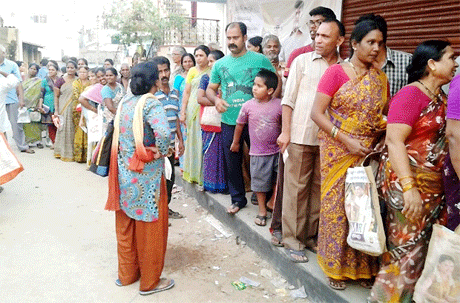When Hunger Whispers
The Ration Shop Diaries: When Hunger Whispers & How Smart Cards Could Answer


The Ration Shop Diaries: When Hunger Whispers & How Smart Cards Could Answer
By Nutritionist Shivani
Dadi’s Counter: Where Grains Held Stories
The scent of wheat, lentils, and unspoken despair hung thick in our family’s tiny shop beside the government ration depot – the "Control." As a child perched beside Dadi, I witnessed a hidden India. Farmers with cracked palms, widows with hollow eyes, exhausted laborers – they didn’t just queue for grain. They came to confess. Dadi listened, her silence a sanctuary. I absorbed tales of leaking roofs, feverish children, and the relentless ache of empty stomachs. The ration shop was a lifeline, yes. But some stories didn’t just teach; they scarred. Especially Jatin’s.
Jatin: The Boy Who Bought Hope, One Toffee at a Time
We called him "Parle Ji." Sixteen, eyes too old for his face, he’d appear multiple times a day, clutching a single rupee. Dadi would trade it for one Parle-G toffee or, rarely, a biscuit packet. It seemed innocent. Until the whispers revealed his truth: his parents gone in a highway crash, a grandmother’s heart giving way, leaving him responsible for two sisters – Priya (12) and little Meenakshi (8).
Malnutrition took Meenakshi first. Her spark faded into a ghostly cough, then pneumonia claimed her. Just Jatin and Priya remained. He swept floors, hauled loads – anything for a few rupees. But cooking? That mountain was too steep. Priya dwindled. One afternoon, her raw, hungry sobs tore through the shop. Pride crumbling, Jatin begged neighbors. Help came, then stopped. "Burden," they whispered. His visits ceased. The news hit like a physical blow: Jatin swallowed poison. A boy shattered not by laziness, but by the crushing impossibility of feeding his sister while clinging to dignity. Dadi wept. My child-heart ignited: Why must survival demand begging or breaking?
The Faces of Hidden Hunger: More Than Just Grain
Jatin’s tragedy wasn’t isolated. It echoed in other whispers:
Shanti: A widow cooking in one home, feeding her three sons barely enough. Books? Uniforms? Dreams of education? Impossible. Shubham and Sibbu dropped out. Only Chhotu clung to school, his future a question mark on Shanti’s weary face. The cost of a notebook meant a skipped meal.
Sohan: The polio-stricken rickshaw puller. His lurching gait spoke of a body at war. Pulling his modified rickshaw earned roti-sabzi, but never the nutrients his ravaged frame craved. Bone-deep pain was his constant companion. Doctor-prescribed calcium tablets? A distant moon. Malnutrition wasn’t just weakening him; it was crippling his ability to earn, deepening his poverty trap. His physical disability was magnified tenfold by nutritional poverty.
The Spark: Food Security Smart Cards (FSSCS)
Sitting with Dadi, a furious clarity emerged: The ration shop gave grain, but not solutions. It sustained life, barely, but didn’t empower it. It ignored the how: How do you cook if orphaned, disabled, or working 18 hours? How do you heal bones broken by labour when only calories are addressed?
My vision crystallized: The Food Security Smart Card System (FSSCS) – not a one-size-fits-all sack, but a key tailored to unlock specific needs:
The Tiffin Card (For Jatin & Priya): Swipe at approved kitchens (community centres, certified eateries) for hot, nutritious meals. Jatin chooses twice a day. Priya doesn’t cry hungry. Meenakshi might have fought pneumonia. Dignity, not dependence. For the elderly, disabled like Sohan on bad days, migrants without stoves – it means survival without the impossible burden of cooking.
The Debit Card (For Shanti): Restricted credit only for essentials beyond grain: school supplies, medicines, seeds. Shanti buys Shubham’s geometry set, Sibbu’s uniform. It feeds futures, breaking the poverty-education cycle.
The Anaj Card (Evolved Ration): Choice, not force. Select from grains, lentils, oils, spices, even flour – tailored via app or shop. Smaller packs for smaller families. Local kirana/online integration for accessibility. Respects diversity.
The Poshan Card (For Sohan & The Invisible Crisis): This card tackles the devastating malnutrition-disability link I witness daily as a nutritionist. Sohan’s pain wasn't just polio; it was calcium deficiency making his bones brittle. Meenakshi’s vulnerability stemmed from chronic undernourishment.
The Science: Kwashiorkor (protein lack causing swelling), Marasmus (calorie lack wasting muscles), Rickets (Vitamin D/calcium deficiency bending bones – often misdiagnosed!), blindness (Vitamin A lack).
The Solution: Targeted supplements: Calcium/Vit D for Sohan’s bones; Iron/Folic Acid for mothers to prevent birth disabilities; protein shakes; weekly eggs/milk. Doctor consults, physio, assistive devices. Healthcare woven into food security.
Why FSSCS Works: Dignity, Data & Prevention
Choice is Power: The system suggests cards based on a vulnerability score (caste, geography, health, income stability), but the beneficiary chooses. Agency = Dignity.
Fights Hidden Enemies: Poshan Card directly attacks malnutrition-induced disability & chronic illness. Prevention is cheaper than cure.
Transparency: Digital tracking slashes corruption. Every rupee accounted for.
Local Boost: Tiffin Cards create jobs for local kitchens; Anaj Cards can involve kirana stores.
Real-Time Data: Understanding needs shapes better policy.
The Unfinished Fight: Will The System Listen?
Today, as a nutritionist, the paradox stings: Supermarkets overflow, yet nutritional despair persists. The myth: "No one dies of hunger anymore." True, perhaps not instantly. But millions die from hunger – the slow violence of malnutrition that weakens, sickens, and disables.
In 2017, fuelled by those ration shop whispers, I sent the FSSCS blueprint to the government. An acknowledgment came. Then silence.
Yet, in my clinic, advising on balanced diets, I still see them:
Dadi’s patient profile, listening.
Jatin’s hand reaching for that toffee.
Sohan straining at his rickshaw, pain amplified by neglect.
Shanti’s eyes, hoping for her sons.
FSSCS isn't just food distribution; it's possibility distribution. It acknowledges hunger’s many faces and vulnerabilities, especially disability intertwined with nutritional poverty. It replaces despair with choice, charity with agency, survival with a chance at health and dignity.
The ration shop taught me government grain saves lives. But smart cards, born from empathy, could transform them. Until then, Jatin’s silent cry remains an open wound, and the promise of unwritten cards hangs heavy – like the scent of grain and hope deferred.
Dadi listened. Will the system?
#FoodSecurity #NutritionForAll #DisabilityRights #EndHunger #SocialJustice #India #PublicHealth #FSSCS #RationRevolution #NutritionistDiaries
(Based on real observations and a proposed solution sent to the Government of India in 2017).
